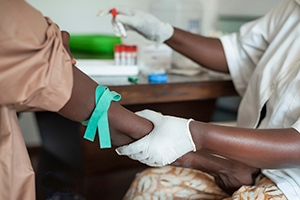Research
Saving Millions? Examining the Effectiveness of Global Health Networks
Q&A with Jeremy Shiffman, Professor, AU School of Public Affairs

We live in a time of growing global health concerns. The Zika virus and Ebola make headlines, while the deaths each year of more than 2.5 million newborn babies in low-income countries get little attention. Why do some health issues receive attention and priority while others are neglected?
New research presented in London on April 26 by American University School of Public Affairs professor, Jeremy Shiffman, highlights the role of networks in how global health problems are addressed. Shiffman was the PI for the study, which examined global health networks in the high burden areas of newborn and maternal mortality, tobacco use, alcohol harm, pneumonia, and tuberculosis.
The studies (9 in total) were published in the journal Health Policy and Planning. Shiffman presented an overview of the findings at the London School of Hygiene and Tropical Medicine.
An expert on the politics of health policy and administration in low-income countries, Shiffman’s work focuses on global and national health agenda-setting: why some conditions receive resources while others are neglected.
This project was supported by the Bill and Melinda Gates Foundation. (doi: 10.1093)
What are global health networks and why did you choose to study them?
Shiffman: “Global health networks are webs of individuals and organizations linked by a shared concern about addressing a particular health problem that affects or potentially affects a sizeable proportion of the world’s population. They link many kinds of actors, including scientists, advocates, health officials, UN agencies and funders. Formal institutions anchor some, such as the Global Polio Eradication Initiative. Informal ties characterize others; for instance, an emerging informal network of surgeons and anesthesiologists concerned with the provision of effective surgical care in low-income settings.
“I chose to study global health networks because they have proliferated in the past quarter century, dramatically changing the way health is governed globally. Today, as opposed to 25 years ago, there exist networks for the majority of health conditions that pose high burdens in low and middle-income settings. I was particularly intrigued by the question of whether the different levels of priority we see across global health conditions might be due in part to differences in the levels of effectiveness of these networks.”
What past research has been done to compare network effectiveness?
Shiffman: “There have been studies of individual global health networks, but very little comparative work, which is another reason I decided to design a project that considers networks comparatively. Doing so helps us generalize about their effects, and about what they do that facilitates or hinders their ability to produce effects.”
Are there factors that shape (or hinder) effectiveness by these networks?
Shiffman: “Many factors matter, but we discovered two that are consistently influential. One is whether networks are strategic about framing—publicly positioning the issue—in ways that attract the concern especially of political elites. For instance, tobacco control proponents have been very effective in portraying the tobacco industry as the vector of disease, and positioning the problem of tobacco use as a public health issue that governments must address.
“The second is whether networks engage in the politics of the issue, rather than stay confined to technical matters. Effective networks move beyond their traditional bases in the health sector to build broad political coalitions that link parliamentarians, national political leaders, UN officials, scientists, advocates and others. Tobacco control, tuberculosis, HIV/AIDS and maternal survival networks have done this well. Other networks have been overly insular.”
Can global health outcomes be predicted based on the strength of a health network?
Shiffman: “Predicting the future is a precarious exercise. Many factors shape whether a global health issue gains attention and resources; network effectiveness is only one among those. So I would have to say no – you cannot predict global health outcomes based on the strength of a global health network. That being said, one of the core findings of our research is that networks do matter, particularly for shaping the way their problems are publicly understood, and for drawing in new actors to address the issue. So they cannot control the future, but they can positively shape it.”

